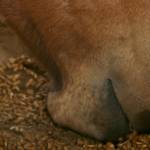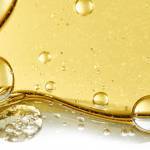Kelp for Horses

Kelp, a type of brown algae often described as large seaweed, was deemed a useful animal-feed additive in the 1930s by veterinarian Juliette de Bairacli. Many benefits of kelp supplementation have been noted over the years, including improved thyroid stimulation, antibacterial and anti-inflammatory benefits, and an upswing in immune function.
Bairacli recommended kelp for animals because of its useful vitamin, mineral, and amino acid profile. Kelp contains appreciable levels of calcium, magnesium, potassium, iodine, and iron. When compared to the amount of trace minerals horses require daily, kelp does not contribute much to the diet at a low feeding rate (usually 15-30 g per day), with the exception of iodine.
Kelp is most commonly fed to horses for the iodine content, as this mineral is necessary for thyroid hormones that regulate metabolism. When there is a deficiency or toxicity of iodine, hypothyroidism or abnormal thyroid activity can result.
According to Nutrient Requirements of Horses, produced by the National Research Council, iodine levels in kelp can be as high as 1,850 mg/kg dry matter, whereas the average iodine requirement is 0.35 mg/kg dry matter. In other words, 1 oz (28 g) of kelp would provide up to 66 mg iodine when the requirement for a 1,100 (500-kg) horse in moderate work is 4 mg per day.
Iodine toxicity has been noted in pregnant mares consuming as little as 40 mg of iodine/day. Goiter due to excess iodine intake has been documented extensively in both mares and their foals, and several cases were associated with large amounts of dried seaweed (kelp) in the diet. This means it is very easy to supply excessive iodine to the horse with kelp and seaweed meal supplements.
Most horses can obtain the necessary levels from iodized salt used in salt blocks or iodine added to commercial feeds or trace mineral supplements. If your horse is getting the manufacturer’s recommended amount of a fortified feed or supplement, additional iodine supplementation from kelp is not needed and could potentially cause toxicity if given in excessive amounts.
If the horse’s diet requires additional trace minerals and vitamins from a supplement, you could use a balancer pellet (All-Phase in Australasia) or the more concentrated Micro-Max (available in the U.S.) or Gold Pellet (Australasia). A safer supplement choice that provides multiple health benefits is fish oil, such as EO•3, which is rich in the omega-3 fatty acids DHA and EPA. These fatty acids mediate the inflammatory response, providing a reduction in joint inflammation, allergic response, exercise-induced bronchoconstriction, and other benefits.
Kentucky Equine Research (KER) nutrition advisors can help balance a ration for any horse, no matter its age or use. If you’d like to start a nutrition evaluation, complete this form.








